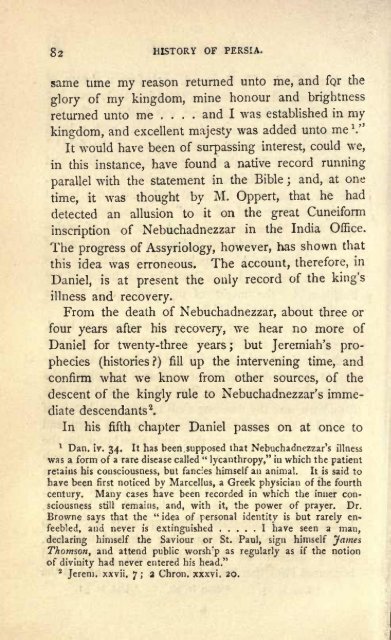Persia from the Earliest Period to the Arab
Persia from the Earliest Period to the Arab
Persia from the Earliest Period to the Arab
You also want an ePaper? Increase the reach of your titles
YUMPU automatically turns print PDFs into web optimized ePapers that Google loves.
g 2 HISTORY OF PERSIA.<br />
same time my reason returned un<strong>to</strong> me, and fo.r <strong>the</strong><br />
glory of my kingdom, mine honour and brightness<br />
returned un<strong>to</strong> me .... and I was established in my<br />
kingdom, and excellent majesty was added un<strong>to</strong> me V<br />
It would have been of surpassing interest, could we,<br />
in this instance, have found a native record running<br />
parallel with <strong>the</strong> statement in <strong>the</strong> Bible ; and, at one<br />
time, it was thought by M. Oppert, that he had<br />
detected an allusion <strong>to</strong> it on <strong>the</strong> great Cuneiform<br />
inscription of Nebuchadnezzar in <strong>the</strong> India Office.<br />
The progress of Assyriology, however, has shown that<br />
this idea was erroneous. The account, <strong>the</strong>refore, in<br />
Daniel, is at present <strong>the</strong> only record of <strong>the</strong> king's<br />
illness and recovery.<br />
From <strong>the</strong> death of Nebuchadnezzar, about three or<br />
four years after his recovery, we hear no more of<br />
Daniel for twenty-three years ; but Jeremiah's prophecies<br />
(his<strong>to</strong>ries?) fill up <strong>the</strong> intervening time, and<br />
confirm what we know <strong>from</strong> o<strong>the</strong>r sources, of <strong>the</strong><br />
descent of <strong>the</strong> kingly rule <strong>to</strong> Nebuchadnezzar's imme-<br />
diate descendants 2 .<br />
In his fifth chapter Daniel passes on at once <strong>to</strong><br />
1 Dan. iv. 34. It has been supposed that Nebuchadnezzar's illness<br />
was a form of a rare disease called " lycanthropy," in which <strong>the</strong> patient<br />
re'.ains his consciousness, but fancies himself an animal. It is said <strong>to</strong><br />
have been first noticed by Marcellus, a Greek physician of <strong>the</strong> fourth<br />
century. Many cases have been recorded in which <strong>the</strong> inner consciousness<br />
still remains, and, with it, <strong>the</strong> power of prayer. Dr.<br />
Browne says that <strong>the</strong> " idea of personal identity is but rarely en-<br />
feebled, and never is extinguished I have seen a man,<br />
declaring himself <strong>the</strong> Saviour or St. Paul, sign himself James<br />
Thomson, and attend public worsh'p as regularly as if <strong>the</strong> notion<br />
of divinity had never entered his head."<br />
2 Jerem. xxvii. 7 ; 3 Chron. xxxvi. 20.

















